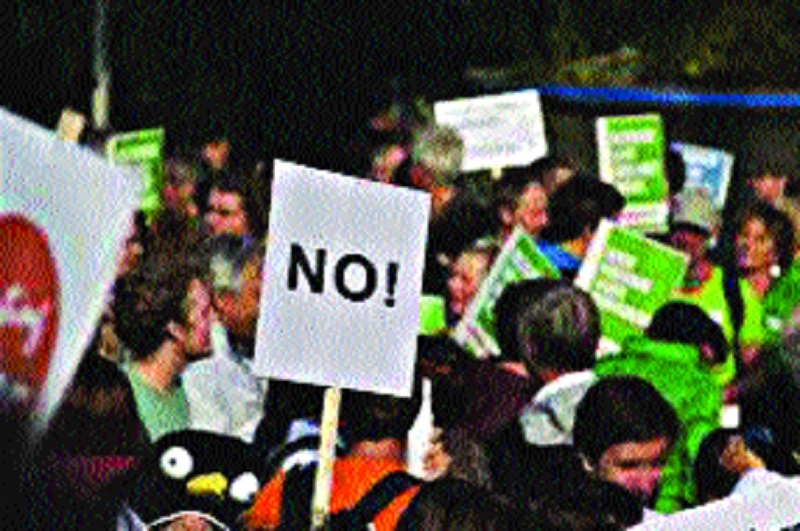Yes, for the art of saying ‘No’
| Date :29-Jan-2020 |

By Biraj Dixit :

“Yes.” “No.” Simple words with seemingly simple meanings should have actually simplified lives. Rather, they seem to be complicating our situations, twisting circumstances and driving humanity apart. Their finality should have brought ease but it is actually threatening peace. The extremity, like an ever-expanding universe, is throwing matter here and there unlike the collective whole that we are so used to be living in. Much, much before the ‘WhatsApp’ got invented to tell the world that ‘no’ was a great word to save you from great many situations I was already upholding the wisdom of it.
Already, I was pouring in much effort to learn the art and craft of putting forth a harmless ‘no’. I admit, it is an arduous task – an art which needs some inborn talent or some continued habituation at being stiff and stubborn. Though far from perfection, I do practise it with some obstinate regularity only to hang on to it. Wisdom and WhatsApp say that one ought to be sure of oneself. And so I have relegated most of my doubts to the back of my mind and now I am absolutely sure that I am sure that whatever I am sure of is the sure thing. But, if I may admit, something often pokes out from the back of my mind.
Surety, you see, is a good thing only when one is sure. But I guess I am sure. And hence my “no” is a capital ‘N’, capital ‘O’ “NO”. I have cultivated this art of saying a definite ‘No’ hard and I will retain it. I am hardly like those old generation people who varied between ‘Well…”, “May be…”, “Perhaps…”, “Let me think about it…” “Well, I am not sure….” blah, blah, blah. I am a 21st century absolutely-sure-about-myself person. Reconsider… and me…? No way. And it’s not just me; look at the entire nation, entire world. Who is reconsidering? We are all so sure. So sure of our beliefs, our convictions and our own thought-processes that reconsideration seems an obsolete art. Gone are the days of reconsideration. I used to reconsider when I was a kid. I was not so sure then and allowed my doubts to change my course.
I remember endless hours, days, months and years of arguments, nay saying, crying and finally agreeing to my father’s commands. I remember, myself telling father that the food in my plate had nothing special about it and that it tasted awful. “I will not eat the green in my plate,” I said during the early days of letting my ‘no’ gain confidence. “Green vegetables are most essential part of our diet. They give us lot of nutrition. Like it or not, they are a must,” he told me with a finality terribly hurtful to my sense of ‘no.’ I continued my arguments, debates and disagreements until one day I fell terribly ill and my father jokingly asked if those medicines tasted better than the veggies? Despite my father’s reprimands, repeated mention in my science lessons and my doctor’s insistence and appeals, veggies found favour with me only after I had consumed sufficient amount of medicines.
At that point, I told myself that it was wise to eat father’s veggies than experience’s bitter pill. My wisdom took a timely U-turn and turned my ‘no’ into a ‘yes’ to my benefit. But then I was a kid - less in comprehension, lesser in confusion and least in conviction. I am a grown-up of the modern world now. I know my ‘Nos’ pretty well. I know it is my right to say ‘no’. It is also a sign of maturity to say ‘no’. A ‘no’ helps you stand out quickly and so I will adhere to my ‘no,’ with a death-like finality.
I am part of the society of like-minded people who have long agreed to disagree and disagreements are absolutely okay. Well, look around we do not even mind disagreements reaching disharmonious proportions, do we? But as a child my convictions were more agreeable to doubts and less susceptible to mortification. So I agreed. I agreed when during fights with my sisters on petty issues, mother would call us to ‘talk it out.’ We were told to sit, to listen calmly to one another, understand and appreciate each other’s desires and fears and then decide in unison. Mamma expected us to take decision after a good long look and after due consideration. “Don’t say ‘no’ just for the heck of it,” my mom used to say. Given a chance, mothers perhaps would say that to the entire nation.
“Talk it out. Sit, listen calmly, understand and appreciate that seemingly tasteless veggies for now will avert the need for bitter pills later.” But will the grown-up me listen? My thoughts are unchangeable and convictions are firmly rooted. When I say ‘no’ I mean no U-turns. I have worked very hard to cultivate this art of saying ‘no’ and have crafted a society thus. It’s a great art for sure. But those doubts in the back of my mind keep asking me, ‘Shouldn’t this art of saying ‘no’ also have some science to it?’ l